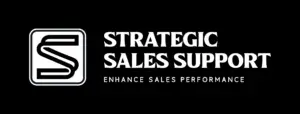Let’s be straight — if your sales team is still juggling leads through spreadsheets, email threads, and memory, you don’t have a sales process. You have a gamble.
At Strategic Sales Support, we work with teams that are already out there winning work. But when growth slows, deals stall, or momentum dips, the issue is almost always the same: no single source of truth. No visibility. No system.
That’s why CRM isn’t just a nice-to-have — it’s the backbone of sales traction.
The Comfort of Chaos: Why Teams Avoid CRM
You’ve probably heard these lines before — maybe you’ve even said them:
-
“We don’t need a CRM, we’re not that big yet.”
-
“We tried one, but no one kept it updated.”
-
“I know where everything is, it’s all in my inbox.”
But here’s what’s really happening:
-
You’re losing track of follow-ups.
-
You’re guessing your pipeline value.
-
You’re over-relying on one or two high performers to hold it all together.
-
You’re one sick day away from a pipeline collapse.
CRM isn’t about replacing relationships or micromanaging people. It’s about creating structure to protect momentum — and identifying gaps before they turn into revenue problems.
What Happens Without a CRM?
Without a functional CRM, your business suffers in ways you won’t always see right away:
1. Pipeline Blind Spots
You think you’ve got $1.2M in the pipeline — until you realise three of those deals haven’t been touched in six weeks and two aren’t real. You’re not managing a pipeline, you’re managing hope.
2. No Rhythm = No Compound Growth
Sales isn’t about luck or even charisma. It’s about consistency. Daily activity. Timely follow-ups. Automated nudges. CRM keeps your cadence visible — so you’re not chasing deals, you’re building momentum.
3. Customer Experience Fails
When follow-ups are late, documents go missing, or a client gets two different answers from two different people, your credibility takes a hit. CRM tools remove confusion and keep everyone aligned.
4. No Feedback Loop
Without data, you’re guessing. Why did we lose that deal? Which sales stage is slowing things down? What’s the real close rate per rep? CRM gives you data that actually fuels improvement.
What a CRM Should Actually Do
Forget the buzzwords. A good CRM should do the following:
-
Show you what’s in the pipeline, what’s stuck, and what’s about to close.
-
Trigger follow-ups automatically so nothing slips.
-
Let the team collaborate on deals without stepping on each other.
-
Create reporting you trust without needing to build a spreadsheet.
-
Make your onboarding and forecasting repeatable and scalable.
And if it doesn’t do these things — it’s not the right CRM.
What We Do at Strategic Sales Support
At SSS, we don’t just tell you to “go get a CRM.” We look at how your business actually works and build a sales rhythm that fits your reality — not someone else’s playbook.
We:
-
Map out your real pipeline stages
-
Define your minimum viable CRM setup (no fluff, just traction)
-
Configure activity-based dashboards so you know what’s moving and what’s not
-
Coach your team to embed CRM into daily habits — without it feeling like a burden
Because if your CRM isn’t being used, it’s not helping. We fix that.
Ask Yourself This
-
Do you know exactly where every live deal sits today?
-
Can you tell which clients haven’t been followed up in the last 14 days?
-
Is your team consistently logging key data that supports better decisions?
-
Could someone new step into the business and pick up the pipeline instantly?
If the answer to any of these is no, your growth engine has a leak.
Final Word: Stop Managing from Memory
We get it. You’re good at what you do, and you’ve gotten this far without a system. But that only works until it doesn’t.
CRM is the foundation for scalable, repeatable sales success. And if set up right — it feels like a tool, not a chore.
